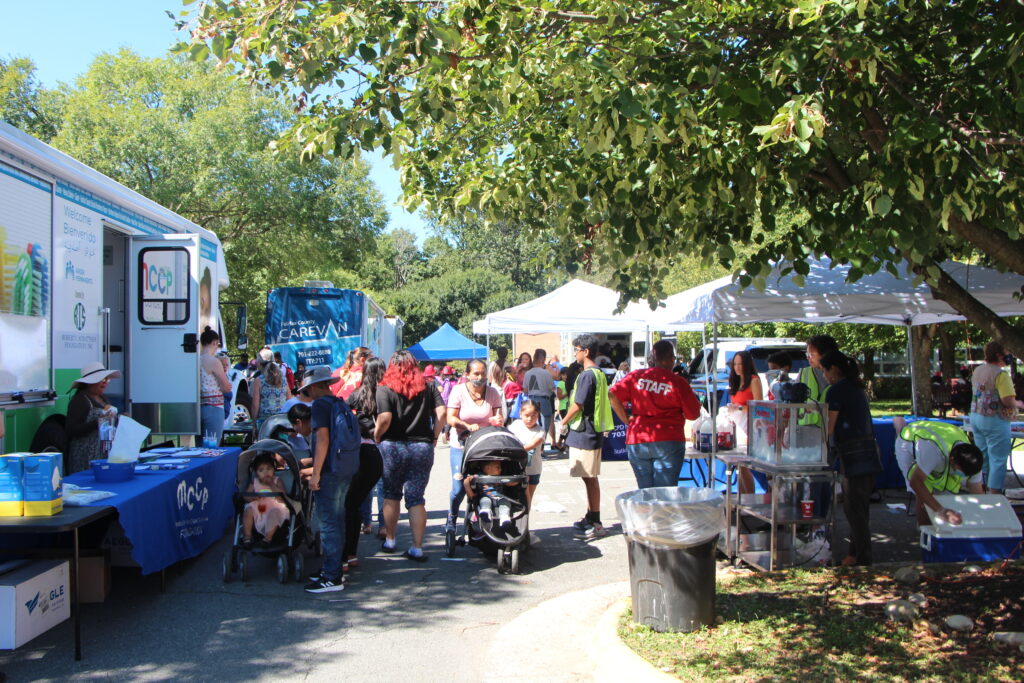GMU project engages with residents of Culmore and Bailey’s Crossroads

George Mason University is spearheading a place-based initiative to bring together residents of Culmore and Bailey’s Crossroads and the organizations that serve them. The project will develop an action plan “to solve systemic-level issues.”
Project Manager Katie Wilson of GMU described the Place-Based Initiative (PBI) for Bailey’s Crossroads and Culmore, known unofficially as the Culmore Collective, at the Sept. 29 meeting of the Bailey’s Crossroads 7 Corners Revitalization Corporation.
Kaiser Permanente awarded GMU a grant to launch the project. Kaiser has supported similar initiatives in other states. This is the first one in Northern Virginia. It’s being run by George Mason’s College of Health and Human Services and the Business for a Better World Center at the School of Business.
Many partners
The goals, Wilson said, are to “build community leaders, grow community engagement and ownership, and foster strategic collaboration toward positive community change.”
“We want to make sure residents are driving our priorities at all levels,” she said. As a result, it’s not clear yet what the final outcome will look like.
The PBI formed a coalition of representatives of organizations that serve the area, including Opportunity Neighborhoods – Crossroads, a project of the Fairfax County Department of Neighborhood and Community Services headed by Second Story that focuses on providing resources to vulnerable families.
“We’re working closely with Opportunity Neighborhoods,” Wilson said. “We don’t want to duplicate their efforts or go back to square one.”
Other groups in the PBI coalition include the Culmore Clinic, the Mason and Partners Clinic, the Medical Care for Children Partnership Foundation, NOVA ScriptsCentral. Dar al-Hijrah Islamic Center, First Christian Church, Columbia Baptist Church, St. Anthony Catholic Church, Just Neighbors, Legal Aid Justice Center, Bailey’s Elementary School, and Justice High School.
Related story: ON-Crossroads helps meet the needs of Culmore residents
Wilson plans to form focus groups of residents within the next few months – at St. Anthony’s, Dar al-Hijrah, the SOS Boat People organization – and other locations to identify the community’s needs.
Several committees have been formed so far.
Economic development
An Economic Development Committee is the farthest along, Wilson said. It’s looking at where people in the community are working and where they want to work and will use that information to consider ways to provide more economic opportunities for residents through education and skills training.
For example, she noted, residents say they want to work in food service, which is currently short-staffed, and want to work more hours.
There are obstacles, however. Some Bailey’s Crossroads/Culmore residents don’t understand how to navigate the American jobs system, don’t know how to handle a job interview or write a resume, and need to strengthen their English language skills.
Second Story and other organizations offer computer classes, but many residents aren’t aware of what’s available.
Related story: Culmore youths feel unsafe
The Housing Committee is working with the Legal Aid Justice Center and GMU to collect data on rental trends. This group plans to create a portal for tenants to look up rent prices and landlord violations.
This is particularly important, Wilson said, since a wave of evictions is expected now that the Covid moratorium has expired.
Another committee, on Access to Healthcare, plans to work with groups that offer free or low-cost health care, such as the Culmore Clinic, GMU’s Mason and Partners (MAP) Clinic in Culmore, and the Medical Care for Children Partnership, and NOVA ScriptsCentral, which provides affordable prescriptions to low-income households.
The Education and Family Supports Committee is exploring ways to partner with schools to help prepare students for college utilizing GMU’s college readiness resources. That group will join with the Economic Development Committee to encourage local businesses to offer students insight into the world of work.
Meeting residents’ needs
“All of these things are so intertwined,” Wilson said. “Residents will be involved in all the committees, helping us brainstorm about what might work.”
Other working groups will look at crime and transportation.
The large turnout at a VDOT meeting on efforts to improve pedestrian safety on Leesburg Pike in August shows that “these residents want to take ownership of their communities,” Wilson said.
Related story: VDOT pursues safety improvements for Route 7 in Culmore
Many members of the PBI participated in a back-to-school fair at the Bailey’s Community Center in August. They distributed school supplies and N95 masks and conducted health checkups.
In November, the PBI will start developing a one-year plan for each committee.
Other projects planned for the future include training sessions, resource fairs, a speaker series, and a website listing events, housing resources, and job opportunities.
The PBI will be a long-term sustainable program, Wilson said. “Kaiser has a real interest in seeing this community thrive.”


As for community involvement should it be heavily involved in the proposed new high rises to be built on the Star supermarket site. Tons of construction jobs, then hundreds of jobs in the retail and hospitality fields. If working closer to home the behemoth project at Seminary will provide thousands of jobs
Great news! This is such a central location with “good bones,” it ‘s revitalization should be encouraged. Hope they are able to get solutions approved and implemented. That’s always the hardest part.